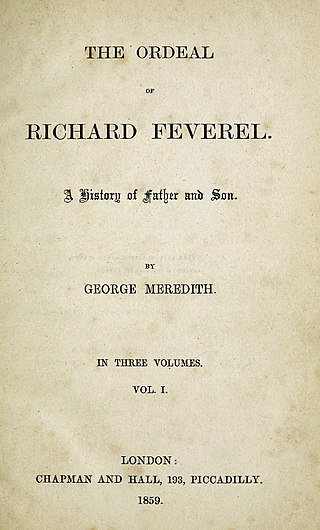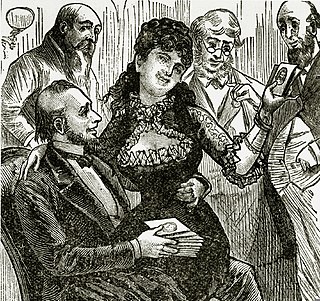Related Research Articles

A brothel, bordello, bawdy house, ranch, house of ill repute, house of ill fame, or whorehouse is a place where people engage in sexual activity with prostitutes. However, for legal or cultural reasons, establishments often describe themselves as massage parlors, bars, strip clubs, body rub parlours, studios, or by some other description. Sex work in a brothel is considered safer than street prostitution.

Victorian morality is a distillation of the moral views of the middle class in 19th-century Britain, the Victorian era.

The Contagious Diseases Acts were passed by the Parliament of the United Kingdom in 1864, with alterations and additions made by the Contagious Diseases Act 1866 and the Contagious Diseases Act 1869.
William Acton (1813–1875) was a British medical doctor and book writer. He was known for his books on masturbation.
Spermatorrhea is a condition of excessive, involuntary seminal discharge. In several cultures, this referred to ejaculation outside of certain approved sexual practices and was thus a subjective term. A more modern medical definition is the excessive release of semen with no accompanying erection or orgasm.

The French Lieutenant's Woman is a 1981 British romantic drama film directed by Karel Reisz, produced by Leon Clore, and adapted by the playwright Harold Pinter. It is based on The French Lieutenant's Woman, a 1969 novel by John Fowles. The music score is by Carl Davis and the cinematography by Freddie Francis.

In Great Britain, the act of engaging in prostitution or exchanging various sexual services for money is legal, but a number of related activities, including soliciting in a public place, kerb crawling, owning or managing a brothel, and pimping, are illegal. In Northern Ireland, which previously had similar laws, paying for sex became illegal from 1 June 2015.

Prostitution in France was legal until April 2016, but several surrounding activities were illegal, like operating a brothel, living off the avails (pimping), and paying for sex with someone under the age of 18.
Prostitution in Singapore in itself is not illegal, but various prostitution-related activities are criminalized. This includes public solicitation, living on the earnings of a prostitute and maintaining a brothel. In practice, police unofficially tolerate and monitor a limited number of brothels. Prostitutes in such establishments are required to undergo periodic health checks and must carry a health card.

Prostitution is a type of sex work that involves engaging in sexual activity in exchange for payment. The definition of "sexual activity" varies, and is often defined as an activity requiring physical contact with the customer. The requirement of physical contact also creates the risk of transferring infections. Prostitution is sometimes described as sexual services, commercial sex or, colloquially, hooking. It is sometimes referred to euphemistically as "the world's oldest profession" in the English-speaking world. A person who works in the field is usually called a prostitute or sex worker, but other words, such as hooker and whore, are sometimes used pejoratively to refer to those who work in prostitution. The majority of prostitutes are female and have male clients.
Prostitution in Poland is legal, but operating brothels or other forms of pimping or coercive prostitution and prostitution of minors are prohibited.

Prostitution has been practiced throughout ancient and modern cultures. Prostitution has been described as "the world's oldest profession", though this is unverifiable, and most likely incorrect.

The Ordeal of Richard Feverel: A History of Father and Son is the earliest full-length novel by George Meredith, published in 1859; its subject is the inability of systems of education to control human passions. It is one of a select group of standard texts that have been included in all four of Everyman's Library (1935), the New American Library of World Literature (1961), Oxford World's Classics (1984), and Penguin Classics (1998). With its rigorous psychological analysis and criticism of contemporary attitudes toward sexuality, it has been seen by some critics as the first modern novel in English literature.

"Fallen woman" is an archaic term which was used to describe a woman who has "lost her innocence", and fallen from the grace of God. In 19th-century Britain especially, the meaning came to be closely associated with the loss or surrender of a woman's chastity and with female promiscuity. Its use was an expression of the belief that to be socially and morally acceptable, a woman's sexuality and experience should be entirely restricted to marriage, and that she should also be under the supervision and care of an authoritative man. Used when society offered few employment opportunities for women in times of crisis or hardship, the term was often more specifically associated with prostitution, which was regarded as both cause and effect of a woman being "fallen". The term is considered to be anachronistic in the 21st century, although it has considerable importance in social history and appears in many literary works.
Canada inherited its criminal laws from England. The first recorded laws dealing with prostitution were in Nova Scotia in 1759, although as early as August 19, 1675 the Sovereign Council of New France convicted Catherine Guichelin, one of the King's Daughters, with leading a "life scandalous and dishonest to the public", declared her a prostitute and banished her from the walls of Quebec City under threat of the whip. Following Canadian Confederation, the laws were consolidated in the Criminal Code. These dealt principally with pimping, procuring, operating brothels and soliciting. Most amendments to date have dealt with the latter, originally classified as a vagrancy offence, this was amended to soliciting in 1972, and communicating in 1985. Since the Charter of Rights and Freedoms became law, the constitutionality of Canada's prostitution laws have been challenged on a number of occasions.
Prostitution in Tibet is thought to have existed for centuries. Testimonies of its existence were provided by outside visitors in the first half of the twentieth century. According to the British writer Christopher Hale, due to the practice of polyandry in Tibet, many women were unable to find a husband and moved to villages and towns, where they fell into prostitution. Their clients came from the caravans crossing the Tibetan plateau, and also from the monasteries.

Hendrik Pierson was a Dutch Lutheran minister and member of the Réveil religious revival movement. He was president of the Ottho Gerhard Heldringstichting, an asylum for reformed prostitutes, from 1877 to 1914. He was one of the leaders of the campaign to abolish state regulation of prostitution, and in 1898 became president of the International Abolitionist Federation..

Eliza Haycraft (1820-1871), was a wealthy brothel madam and philanthropist, who donated money to the widows and orphans of the American Civil War.
Prostitution in Paris, both in street form and in dedicated facilities has had a long history and remains present to this day.

The history of prostitution in France has similarities with the history of prostitution in other countries in Europe, namely a succession of periods of tolerance and repression, but with certain distinct features such as a relatively long period of tolerance of brothels.
References
- ↑ Acton 1870, p. Xi.
- ↑ Eltis 2013, p. 73.
- ↑ Anderson 1993, p. 52.
- ↑ Mora 2006, p. 39.
- ↑ Peabody & Richardson 1892.
- ↑ Gale 2002, p. 245.
Bibliography
- Acton, William (1870). Prostitution, Considered in Its Moral, Social, & Sanitary Aspects, in London and Other Large Cities and Garrison Towns: With Proposals for the Control and Prevention of Its Attendant Evils. Churchill.
- Anderson, Amanda (1993). Tainted souls and painted faces: the rhetoric of fallenness in Victorian culture . Cornell University Press. ISBN 978-0-8014-2781-7.
- Eltis, Sos (18 April 2013). Acts of Desire: Women and Sex on Stage 1800-1930. Oxford University Press. ISBN 978-0-19-969135-7.
- Gale, Steven H. (2002). Sharp Cut: Harold Pinter's Screenplays and the Artistic Process. University Press of Kentucky. ISBN 0-8131-2706-8.
- Mora, Sergio de la (1 June 2006). Cinemachismo: Masculinities and Sexuality in Mexican Film. University of Texas Press. ISBN 978-0-292-71297-3.
- Peabody, Selim Hobart; Richardson, Charles Francis (1892). The International Cyclopedia: A Compendium of Human Knowledge. Dodd, Mead.